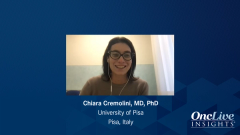
Treatment Options After Progression on Chemotherapy/Anti-EGFR Therapy for mCRC
Experts in gastrointestinal cancers explore treatment approaches, such as with regorafenib, in patients with mCRC who have progressed on chemotherapy/anti-EGFR therapy.
Episodes in this series

Tanios S. Bekaii-Saab, MD: Moving on to follow-up on that same case. The patient was started on FOLFOX [folinic acid, fluorouracil, oxaliplatin] and bevacizumab for 8 cycles, and the first scan actually showed some stable disease. The second scan unfortunately showed progression in the peritoneum, maybe a little in the lungs, but primarily in the peritoneum. From the 8 cycles of FOLFOX, she already experienced some neuropathy, grade 1, which lingered, but her performance status remained at a 1. The patient was then switched to FOLFIRI [folinic acid, fluorouracil, irinotecan] and bevacizumab for 8 cycles, and again, responded well to treatment, and went on a maintenance therapy, capecitabine and bevacizumab in this setting. However, within 4 months, she started experiencing more fatigue and shortness of breath, and then her imaging shows new growth in her lungs, maybe again a bit in the peritoneum. Her performance stance remains well at 1, she’s relatively functional, and the patient still desires more treatment.
Going back, we’ll start with Gerald on this one, what do you think about options? This is a patient with mutated KRAS G13D colorectal cancer, had FOLFOX and FOLFIRI with bevacizumab...and really good performance status, liver function adequate, bone marrow reserve adequate. What’s the line of thinking here?
Gerald Prager, MD: Indeed, we have options beyond the second-line setting. On the one hand, we have regorafenib, and I think this would be a good candidate because of the lung metastases and I think…good liver function. The patient is fit, so would be a very good candidate. The other one is trifluridine and tipiracil as an approved option in this setting. I think both options can be discussed with the patient, as they have different toxicity profiles and variable options for this patient.
Tanios S. Bekaii-Saab, MD: Chiara, with the 2 options available, and we always have some level of bias in our discussion with patients because of our experiences, because of real-world evidence around us. How do you discuss this with your patients?
Chiara Cremolini, MD, PhD: I think that both options may work, but in this case, I would suggest to use at this point regorafenib. This is because this patient is quite young, has no liver impairment, and she’s quite fit to receive a treatment that may have more subjective toxicity compared with trifluridine/tipiracil. Moreover, having a chemotherapy-free interval may be beneficial for the patient at this point because she received the first line with modest benefit, and then immediately, a second line, and then maintenance. Basically she’s receiving fluoropyrimidine, and now it's probably 16months. So having a free period maybe be beneficial also to recover from adverse events.
For sure, we need to be very clear with the patient that the best result we can achieve with these kinds of treatment options is disease stabilization. We should not expect to have huge tumor shrinkage, a great objective response. But at this point, we are in front of a refractory disease, where the only aim of our treatment is slowing the growth of the tumor and achieving disease stabilization that may last some months. With this in mind, we can offer our patients these options. Remember that both of them, especially in this case I would go for regorafenib, regorafenib has demonstrated significant survival advantage in more than 1 randomized clinical trial. I think that in the case of the motivated patients these are good options, while explaining the adverse events potentially related to the use of the drugs, but also the strong points of these drugs in terms of mechanism of action, and of not being a chemotherapy option. I think also patients may be well aware of what to expect, and so whether or not to continue their therapeutic route.
Transcript Edited for Clarity







































